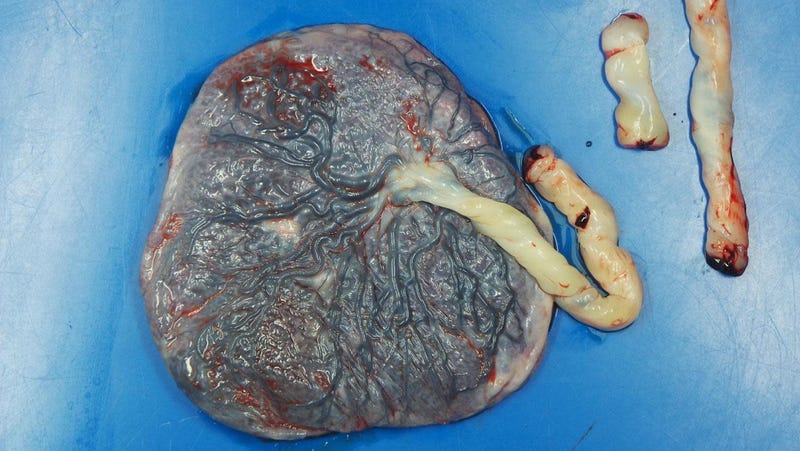
Pregnant Women With Covid-19 May Have Higher Risk of Placenta Injury, Study Finds
by Ed CaraA small study suggests that women who contract covid-19 while pregnant may be at higher risk for complications. Compared to uninfected women, women with covid-19 had a greater chance of injury to their placenta, the study found.
Infectious diseases like covid-19 can oftentimes be especially risky to pregnant women and their babies. Germs like rubella and Zika, for instance, are relatively harmless to adults but are known to cause miscarriage or serious birth defects in children whose mothers catch it while pregnant. And there’s evidence that other coronaviruses related to the virus that causes covid-19, like SARS and MERS, are linked to severe complications during pregnancy.
In this new study, published in the American Journal of Clinical Pathology, researchers examined the placentas of 16 pregnant women diagnosed with covid-19. They were then compared to (previously examined) placentas from women who gave birth prior to 2019.
One of the women suffered a miscarriage at week 16, while another had an early delivery at week 34. Among those who had a live birth, there were no reported health problems among the babies. But there was evidence of injury to the blood flow of the placenta in 12 of the 15 women – a rate of blood flow injury higher relative to the control group. Six women also had blood clots in their placenta and five had a smaller-than-expected placenta.

A placenta taken from a women who contracted covid-19. Researchers found that infected women had a greater risk of blood flow problems in their placenta, which could be harmful to their pregnancy. Photo: Northwestern University
Other research has suggested that covid-19 isn’t causing a higher risk of complications in pregnant women. But this is the latest bit of data to indicate that the risk isn’t zero.
“They were healthy, full-term, beautifully normal babies, but our findings indicate a lot of the blood flow was blocked off and many of the placentas were smaller than they should have been,” said study author Emily Miller, an assistant professor of obstetrics and gynaecology at Northwestern University in Chicago, in a statement released from the university. “Placentas get built with an enormous amount of redundancy. Even with only half of it working, babies are often completely fine. Still, while most babies will be fine, there’s a risk that some pregnancies could be compromised.”
Research has been mixed at best on whether the coronavirus that causes covid-19 can be passed from mother to fetus in the womb. But the possible effects on pregnancy don’t need to involve direct infection, since the illness can cause inflammation and affect a person’s circulation. These harmful changes in a pregnant woman could then trickle down to the placenta and affect the fetus.
What’s unclear now is the scale and frequency of these risks, and whether they are affected by the severity of the mother’s illness. In the one miscarriage observed in the study, for instance, the woman was asymptomatic at the time. It’s possible the woman’s miscarriage was completely unconnected to her infection. Other reports of miscarriages possibly related to covid-19 have involved more severe illness.
Either way, it’s more evidence that this pandemic may have long-reaching health effects on the population at large, even for those not at great risk of dying from it.
Featured image: Getty